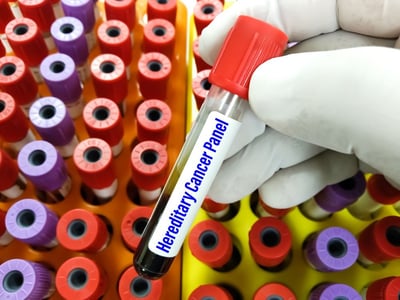FORCE's eXamining the Relevance of Articles for You (XRAY) program looks behind the headlines of cancer news to help you understand what the research means for you.
XRAY is a reliable source of hereditary cancer research-related news and information.
Learn more about the XRAY program
Categories Genetic Testing
Relevance: Medium


Personal Story : Living a full life with Li-Fraumeni syndrome
Relevance: Medium


Most relevant for: People with Li-Fraumeni syndrome
This XRAY review is about a five-time cancer survivor who has an inherited mutation in the TP53 gene. People with inherited mutations in TP53 have Li-Fraumeni syndrome, which is linked to a very high lifetime risk for many types of cancer. Here we share his inspiring story and provide more information on Li-Fraumeni syndrome. (Posted 4/16/24)
Este artículo está disponible en español.
Read More
Relevance: High


Strength of Science: High


Research Timeline: Post Approval


Study : Genetic testing among people with cancer can find mutations that may affect treatment and prevention
Relevance: High


Strength of Science: High


Research Timeline: Post Approval


Most relevant for: People diagnosed with cancer who have not yet had genetic testing
Despite national guidelines recommending genetic testing, less than 10 percent of eligible patients had genetic testing within two years after their cancer diagnosis. Among those who had testing, 10-30 percent had an inherited mutation that could affect their medical care. (Posted 3/15/2024)
Este artículo está disponible en español.
Read More
Relevance: Medium-High


Strength of Science: Medium-High


Research Timeline: Post Approval


Study : Genes linked to aggressive prostate cancer
Relevance: Medium-High


Strength of Science: Medium-High


Research Timeline: Post Approval


Most relevant for: People diagnosed with advanced prostate cancer
Previous research has linked some inherited mutations to prostate cancer risk. This study found a link to additional genes that should be added to prostate cancer gene panel tests. The study also looked at which genes were most closely linked to aggressive prostate cancer that is more likely to spread. (Posted 2/1/24)
Este artículo está disponible en español.
Read More
Relevance: Medium-High


Strength of Science: Medium-High


Research Timeline: Post Approval


Study : H. pylori bacteria infection and risk of stomach cancer in mutation carriers
Relevance: Medium-High


Strength of Science: Medium-High


Research Timeline: Post Approval


Most relevant for: People who are at increased risk for stomach cancer due to an inherited mutation.
The results of a study in Japan show that people with a bacterial infection called H. pylori and an inherited mutation in an ATM, BRCA1, BRCA2 or PALB2 gene have a high risk of stomach cancer. (Posted 1/19/24)
Este artículo está disponible en español.
Read More
Relevance: Medium


Article : Breast cancer risk for transgender women with inherited mutations
Relevance: Medium


Most relevant for: Transgender women with inherited mutations who are considering or have had gender affirming care
There has been little research on breast cancer risk for transgender women who are at high risk for breast cancer due to an inherited mutation. This review summarizes what we know. (Posted 11/29/23)
Este artículo está disponible en español.
Read More
Relevance: High


Quality of Writing: Medium-High


Article : Genetic testing and the future of medicine
Relevance: High


Quality of Writing: Medium-High


Most relevant for: People interested in genetic testing.
An article published in Katie Couric Media discusses genetic testing and how it can impact health. The author talked with Dr. Robert Steiner, a doctor who specializes in genetics. He talked about genetic testing and how the results can affect health and change lives. (Posted 9/28/23)
Este artículo está disponible en español.
Read More
Article : A food lover’s decision to remove her stomach highlights difficult decisions around cancer risk
Most relevant for: People with a CDH1 mutation or a family history of stomach cancer
National Public Radio reporter Sáša Woodruff shares her story of learning about her CDH1 mutation and making a decision about risk-reducing surgery. Mutations in the CDH1 gene significantly increase a person’s risk of stomach and breast cancers. Woodruff’s personal essay describes the psychological challenge of making decisions about risk-reducing surgeries and draws attention to a lesser-known mutation linked to hereditary cancer. (Posted 5/17/23)
Este artículo está disponible en español.
Read More
Relevance: Medium-High


Strength of Science: Medium-High


Study : Teens and young adults respond well to learning about familial cancer risk
Relevance: Medium-High


Strength of Science: Medium-High


Most relevant for: Mothers who have had genetic testing for BRCA1 or BRCA2 whether or not they have been diagnosed with breast or ovarian cancer
Little is known about how awareness of hereditary cancer in a high-risk family affects the quality of life of teens and young adults. This study looked at the lifestyle choices, cancer awareness and quality of life of adolescents and young adults whose mothers had undergone testing for a BRCA mutation. (Posted 10/11/2022) Este artículo está disponible en español.
Read More
Relevance: High


Quality of Writing: Medium-High


Research Timeline: Post Approval


Article : Chris Evert's ovarian cancer diagnosis highlights the importance of genetic counseling and testing
Relevance: High


Quality of Writing: Medium-High


Research Timeline: Post Approval


Most relevant for: People with genetic test result called a VUS
Tennis star Chris Evert shared her story about a change in her sister's genetic test results that led Ms. Evert to have genetic testing and her decision to have her ovaries removed to lower her cancer risk. Ovarian cancer was found at the time of Ms. Evert’s surgery, but fortunately, it was caught early. Her story highlights the importance of genetic counseling, testing and post-testing follow-up with experts. (Posted 2/8/22). Este artículo está disponible en español.
Read More
Relevance: High


Strength of Science: High


Research Timeline: Post Approval


Study : Mutations in BRCA1 or BRCA2 may increase risk for endometrial cancer
Relevance: High


Strength of Science: High


Research Timeline: Post Approval


Most relevant for: People with BRCA1 or BRCA2 mutations
A Dutch study added further evidence that women with a BRCA1 mutation may have an elevated risk for endometrial cancer. The study found that the endometrial cancer in women with either a BRCA1 or BRCA2 mutation was more likely to be an aggressive form of cancer associated with a poor outcomes. (posted 11/30/21)
Este artículo está disponible en español.
Read More